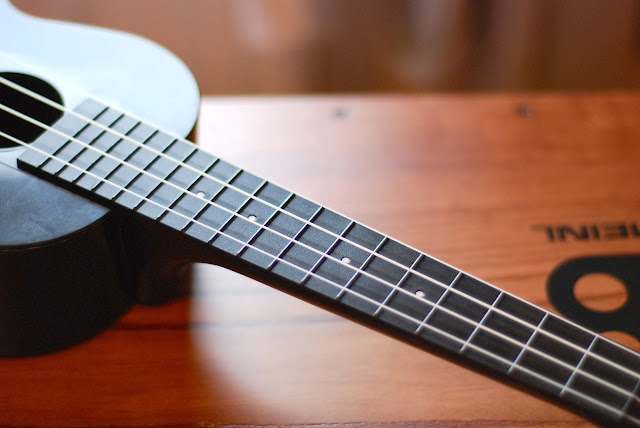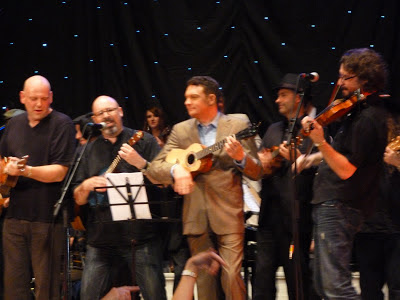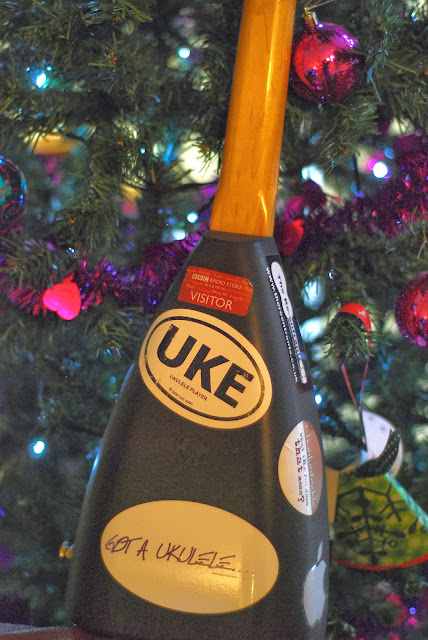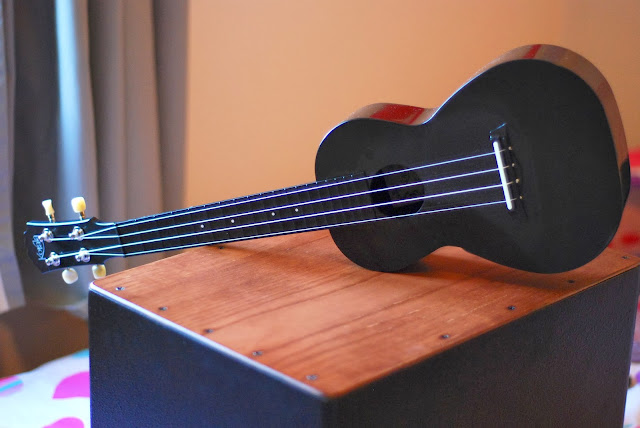Time for another instrument review, and a rather interesting one. The Korala 'Explore' concert ukulele. Could this knock my usual recommendation for the best cheap starter uke (the Makala Dolphin) off it's perch?
The fist thing that stands out with this one, is that the uke is almost 100% made of ABS plastic. It was helpfully brought to my attention in a
great review by ukulele pal Simon Taylor, who thought quite highly of it. I had been thinking about plastic ukes for a while, and this caught my eye for a number of reasons. Firstly, 'plastic?' I hear you say... Yes plastic. There is actually nothing all that much new in the concept of a plastic uke. I blogged about it
HERE some time ago, and whether you want to go back to the vintage Maccaferris and TV Pal ukes that now have collectors in a froth, or look at more recent incarnations such as Fleas, Flukes and the Outdoor Ukulele, there is really nothing new under the sun.
Actually, it was the Outdoor Ukulele that I first played earlier this year that has had the subject of plastic ukes in my mind. They were not totally new to me as I have been an owner of a Flea and Fluke for some years (sure, they are not totally solid plastic, but have plastic backs, sides and fingerboards), but the Outdoor uke really created a buzz online on account of it being TOTALLY plastic and therefore fitting the 'Outdoor' take anywhere tag. In reality, based on the couple of examples I have played I really dislike them. This excellent
video from Ukeeku really sums up all my gripes - a horrible echoey sound, terrible peg tuners which you really need to replace with gears (meaning the 100% waterproof claim is now blown), a horrible angular feeling neck, and, in my opinion, a quite crazy price tag. As much as I would like to review one, I am not spending that money! As such, when the Korala came to my attention - all plastic bar the tuners, but for a price of only £30, I really needed to take a look. It may be helpful in this review to draw comparisons to those other plastic based instruments I have had experience with, namely the Flea (circa £150) and the Outdoor (circa £100).
The Korala Explore comes from the far east, and is distributed under this UK based brand. This was supplied by the excellent
Omega Music who delivered it for £30 all in. Quite the bargain price. A bit of research shows me that these have also been distrubuted under the Clearwater brand, and as a rebadge of a far eastern product I wouldn't be surprised if they existed under other names elsewhere in the world too.
That name 'Explore' seems to take on the same sort of connotations as the 'Outdoor' name - meaning that they envisage this being a rugged take anywhere instrument. Being totally plastic, that will be true to some degree (more on that below), but the geared tuners will stop it being totally waterproof. That said, whilst the Outdoor uke was indeed totally waterproof with the peg tuners, those peg tuners were so woeful that most people swapped them out, losing that total waterproof status. But I am referring to the Outdoor here for another reason. The scale length. The Korala is a concert scale uke, and this is where I think (if they are marketing it as a backpacker instrument) it loses out to the Outdoor and the Flea. You see, those latter two are soprano scale and very easy to find room for in a backpack or suitcase. In my experience, concert scales do tend to be pushing the limits a little on portability (without sticking out) and can with some carriers present issues as carry on luggage. One wonders whey they didnt consider a soprano scale? On that point, the logical answer to me seems to be the myth that concert ukes are easier for beginners due to fret spacings. I don't think that is true, and believe nut width is more helpful in this regard. Either way, this is a standard concert scale instrument.
The whole of the instrument is made from injected moulded plastic, body, neck, fingerboard and headstock included. In fact as far as I can tell, only the tuners are non plastic parts... This one comes in black, but it is pleasing to see that they offer them in a range of bright colours for those less morbid than me. The finish is rather shiny and slippy and it feels very light in the hand. To me, the Outdoor finish is a little more tactile as it has a more matte finish (and the body pieces feel a little thicker to me also (again more on that below)). Still, the beauty of injected moulded parts is that they are all the same, and on this example the whole thing goes together neatly and flush.

It comes in a standard double bout ukulele shape. On the top, there are no adornments, or stickers. The bridge mount is made of plastic and appears to have been glued or bonded on to the top and holds a standard looking white bridge saddle. This is nice to see, and differs from both the Outdoor and Flea instruments that use one piece moulded saddles that cannot be adjusted. Looking inside it looks like... well it looks like the inside of a plastic box. Not much to see here, although it is adorned with a Korala logo label behind the sound hole. Through the injected moulded top, if held in the light one can see some fan bracing emanating from the sound hole area to strengthen the top, with another brace piece in the moulding just north of the sound hole. The back appears to use horizontal bracing pieces you would see on a wooden instrument, although they are moulded into the body.

The back and sides are plain also, and the back is bowed to help with sound projection. The giveaway to the injection moulding is the dimple on the back (and on the back of the headstock) left from the process, much as you see on the back of a Flea.
The plastic neck is not attached to the body with a joint - in fact it is part of the same piece of plastic which makes the whole of the back, sides, neck and rear of the headstock! It is a nice profile, a little shallow for my liking, but much more of a ukulele neck than the Flea (which is a little angular, and, admittedly, made of wood) or the Outdoor (which has a neck profile so angular it is seriously uncomfortable to play). The Korala neck is very easy to hold and play, although I would have preferred a slightly more matte finish as it feels a little slippy in the hands.
The fingerboard is made of a one piece and is moulded in plastic mounted to the top of the neck, complete with the frets (just like the standard Flea and the Outdoor). Whilst some may recoil in horror at this, it is actually a rather clever idea as it guarantees the accuracy of the fret placement, height etc. As such, this should prove to be an accurate player. I know some people dont like plastic fingerboards, but I have always gotten on with my Flea and Fluke so they dont bother me and in fact I find them quite comfortable. This feels very similar to my fingers as the Flea, so no bad thing at all. The frets, being black, can be hard to see in dim light, but that goes for the Flea and the Outdoor also. There are 18 frets in total (with 14 to the top of the body), and fret markers at the 5th, 7th, 10th and 12th. It is nice to see that these appear to be inlaid in white plastic unlike the Flea which were just screen printed on and have since been rubbed off. Sadly, there are no side fret markers Unlike the Flea, this does not make use of a zero fret to complete that totally accurate fingerboard, and uses a standard cut nut that is part of the moulding. That said, it is shaped just fine.

On to the plastic headstock - it seems to me overly narrrow and looks a little odd to my eyes. That is made noticeable by the angle taken by the G and A strings from the nut and that is something to keep an eye on in terms of string wear. The back of the headstock forms part of the one piece moulding of the back, sides and neck, but is completed by a plastic facing piece on the top. Overall though I like the shape of it if not the width.

Tuning is provided by pretty cheap feeling unbranded open geared tuners. But they work just fine on this model, are not too sticky and hold very well. The uke is finished off with a screen printed Korala logo and the ubiquitous Aquila strings (what else). No gig bag is included. Those Aquila strings are a question mark for me. I know they are a love or hate string, but I am not a fan as I find they can make the sound of instruments boom a little. They work wonders in driving thick laminate tops on instruments like Dolphins, but on a hollow thin plastic box like this, I fear they may accentuate the plastic construction. Certainly that is how I have found Aquilas on the Flea and use Worths on mine.
And there we have it. I think it is rather neat, and it appears to overcome some of the issues I have with the Outdoor at a FAR more sensible price. But the proof is in the playing...
Set up wise, let's start at the nut first of all. As I say above, this is just about perfect, the slots are not high, so there are no intonation issues at the lower frets at all. Down to the bridge end though, and the action gets too high when you get down to the lower frets. No worries I thought, I will just take the saddle down a little. But on closer inspection, there is actually a bow in the neck like the bridge is pulling closer to the nut. That is not a permanent bow though, like the instrument is faulty - it is there on account of tension. In other words the neck is pulling forward with the tension of the strings and that raises them noticeably above the lower frets. I grabbed the uke, and you can actually make it bow yourself, and in both ways. Strumming the open strings if I push the neck from behind the tuning goes low, and if I pull it back they go sharp! (see the video review below to check that out). It seems evident to me that there is not enough strength in the neck and it needs some internal bracing to stop that happening. Tapping it suggests it is hollow, unlike the Outdoor which I believe is braced. As such, with the action at the nut just about right, if I take the saddle down and bow the neck back a little during playing, I am going to mute off the strings on the lower frets. One thing I may try is a string change as Aquilas have quite a bit of tension and wonder if some lower tension fluorocarbons would help ease this issue.
Examining the bridge mount also, this seems to be dipping a little into the body due to the same tension, which suggests the top is not quite as strong as it might be... And on that point - the quality of the plastic here seems a little more 'brittle' (if that is the word) than that used by the Flea or the Outdoor. How rugged this is therefore.... well. I have not checked it in a drop test! I did drop a Flea down the stairs once and it was still in tune at the bottom. I don't want to test this in the same way, but the plastic feels like it could possibly crack..
However.... I am telling it like it is, and to an extent, I am nit picking. There is no reason that when playing I should be moving the neck like that, it is bad beginner technique and with a lighter touch it will be fine. In addition, this has quite a long neck and it is perfectly acceptable action wise up to around the 10th fret. And on cheap comparable sopranos such as the Makala Dolphin, things on those get a bit ropey at the 10th fret and beyond anway... I suppose that brings me back to the question, why not make this in a soprano scale? The Outdoor does not suffer in this way, but it instead presents all sorts of other problems with flappy echoing strings that are not present on the Korala. The Flea is the only one that has it nailed in this regard with a solid neck and nice low action all the way down the fingerboard. But then the Flea is five times the price.

Sound wise I was really pleasantly surprised. Sure, it sounds plastic (though nowhere near as bad as the Outdoor) though not overly so. It has some plastic sounding echo on the lower notes, particularly when played hard, but loses any plastic sound a little higher up the neck, and has a pleasing tone to my ears. It is a bright sound with lots of volume. Sadly I think those Aquila strings DO overpower it a little and it can bark when strummed in anger. Intonation on those lower frets is nice and accurate and it is very light to hold and easy to play. It is in fact a LOAD of fun to play and will certainly be a talking point uke. I sound like I am being hard on the instrument with the moving neck, but in play it really doesnt manifest any problems to me. I do wish the action could be lower further up, but for a beginner I would question how important that would be. Sure, you are not getting £1000 tone here, but really, it has volume and character that I have seen missing on several £100-£200 wooden concert ukes!
So I will end as I started, by working out where this sits in comparison to the Flea and the Outdoor uke...
Well the Korala wins all round on price. For me £30 is a amazing price. It should put Outdoor to shame as they are essentially the same thing. It is perhaps unfair to compare to a Flea which also employs woods, better tuners etc, but you really cannot argue with £30. Perfect for a new player, and the sort of money that seasoned player should be prepared to drop on getting a beater for camping or the beach without too much questioning.
Build quality and materials are not up to the Flea standard (and nor would it be). - but despite them both being plastic, you could dunk the body of this in the drink and not worry - you would not do that with a Flea on account of the wooden top. The Outdoor is definitely more solid feeling and does not bow in the neck, but then there are many other issues that instrument has that do not appear here.
Sound and playability though, it can't beat the Flea, but I think is FAR better than the Outdoor uke. It feels and sounds like a ukulele to me. The neck is easy to hold and move around on, and it doesnt suffer from that echoey slap sound that plagues the Outdoor.
But again, back to the price..... £30, why wouldn't you? I personally think this may be up there with the Makala Dolphin as an ultra cheap uke recommendation now... Sure, the bowing neck thing may fox some people, but it otherwise arrives with no reason for a setup, is louder than the Dolphin and seems fairly indestructible with no paint to chip or scratch. Surely it has to be a recommendation from me?
Interested in grabbing one -
here's a link!
FOR
Price price price!
Fun factor
Volume
AGAINST
Build strength
Plastic quality
SCORES
Looks - 7.5
Fit and Finish - 7
Sound - 7.5
Value For Money - 10
OVERALL - 8 out of 10
To understand my review scoring and see this result in context - visit my review page at
And as such, it just pips the Makala Dolphin
On to the video review!!





































